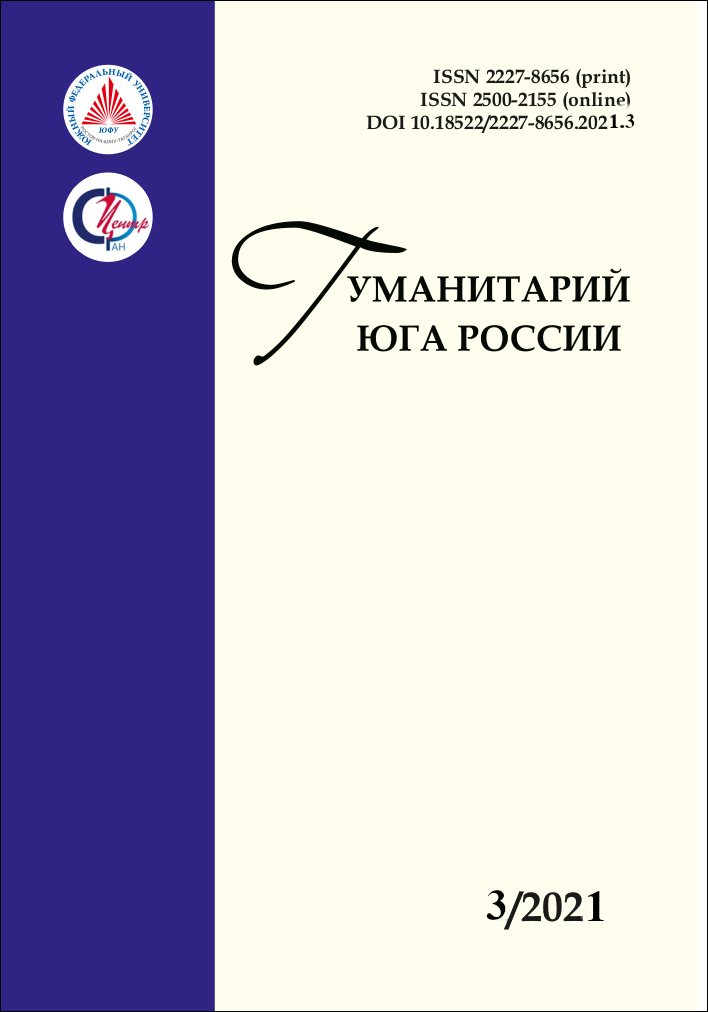Ценностно-религиозные представления об устройстве региональной общности
Научная статья
Аннотация
Литература
2. Бабич Н. С., Хоменко В. Ш. Шкала «предрасположенность к религиозности»: концептуальные основы // Социологические исследования. 2016. № 6. С. 65–71.
3. Гараджа В. И. Социология религии : учеб. пособие для студентов и аспирантов гуманитарных специальностей. 3-е изд., перераб. и доп. М.: ИНФРА-М, 2005. 348 с.
4. Гезиханов Р. А. Исламская экономика и предпринимательство : учеб.-практ. gособие. 3-е изд., доп. Грозный: Изд-во Чеченского гос. ун-та, 2020. 364 с.
5. Добаев И. П. К вопросу о религиозной чистоте «истинного ислама» // Гуманитарий Юга России. 2020. Т. 9 (43), № 3. С. 202–215.
6. Кофанова Е. Н., Мчедлова М. М. Религиозность россиян и европейцев // Мониторинг общественного мнения. 2010. № 4 (98). С. 201–230.
7. Максименко А. А. Социологическая интерпретация понятия «ценность» // Вестник КГУ им. Н.А. Некрасова. 2011. № 2. С. 284–291.
8. Малашенко А., Тренин Д. Время Юга: Россия в Чечне, Чечня в России / Моск. центр Карнеги. М.: Гендальф, 2002. 267 с.
9. Мациевич И. В., Семедов С. А. Политические религии в современном мире // Вестник Института социологии. 2012. № 4. С. 36–49.
10. Социология межэтнической толерантности / отв. ред. Л.М. Дробижева. М.: Ин-т социологии РАН, 2003. 222 с.
11. Фонд имени шейха Зайеда увеличит финансирование бизнес-проектов Чечни до $1 млн. Режим доступа: https://tass.ru/ ekonomika/ 5824437.
12. Юсупов М. М. Ислам в социально-политической жизни ЧР // Кавказ и Центральная Азия. 2000. № 2. С. 164–171.
13. Abdulla M. R. Culture, Religion, and Freedom of Religion or Belief // The Review of Faith & International Affairs. 2018. Vol. 16, N 4. P. 102-115. DOI 10.1080/15570274.2018.1535033.
14. Ashaari M. F. et al. An Assessment of Teaching and Learning Methodology in Islamic Studies // Procedia − Social and Behavioral Sciences. 2012. Vol. 59. P. 618-626. Available at: https://www.researchgate.net/publication/.
15. Bader V. Secularism or democracy? Associational governance of religious diversity // Journal for Contemporary Philosophy. 2007. Available at: https:// www.researchgate.net/ publication/37710846.
16. Fuller G., Kurpershoek M. What Future for Political Islam? Dilemmas and Opportunities for the Next Decade. WRR lecture. 2004. Available at: https:// www.wrr.nl.
17. Harmsen E. Islam, Civil Society and Social Work: Muslim Voluntary Welfare Associations in Jordan between Patronage and Empowerment. Amsterdam University Press, 2008. 500 p. DOI 10.5117/9789053569955. Available at: http:// library.oapen.org/handle/20.500.12657/35215.
18. Mazurkiewicz P. Policy on Religion in the European Union // Religions. 2020. Vol. 11. P. 534. DOI 10.3390/rel11100534. Available at: http:// www.mdpi.com/journal/religions.
19. Maxwell C.C. Musingafi, Mafumbate Racheal, Khumalo F. Thandi. Traditional conflict management initiatives in Africa: Wellness models for southern Africa and the Zimbabwean crisis // Journal of Culture, Society and Development. 2019. Vol. 47. P. 60-67. DOI 10.7176/JCSD. Available at: http:// www.iiste.org.
20. Murphy J.B. Religious Violence Myth or Reality? A Symposium on William T. Cavanaugh’s The Myth of Religious Violence // Political Theology. 2014. Vol. 15, N 6. P. 479-485. DOI 10.1179/1462317X14Z.00000000093.
Поступила: 26.04.2021
Опубликована: 29.07.2021






